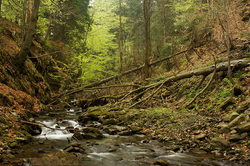 Since this is Naturopathic Medicine week I thought a great place to start was with a little bit of education about Naturopathic Medicine itself. I've always been a fan of mythbusters, Jaime and Adam really know how to have some fun busting myths wide open. So I thought I could do a little mythbusting of my own by tackling some of the common myths I hear about Naturopaths and Naturopathic Medicine in general (minus the dangerous explosions of course). Myth #1 Naturopaths are the same as Homeopaths Naturopaths and Homeopaths are two different alternative medicine professions. Although it is true that as part of our training and scope of practice we learn about Homeopathy, it is one of several types of medicine we cover, and Homeopaths learn only Homeopathy. We also learn about Botanical Medicine, Nutrition, Lifestyle Counseling, Traditional Chinese Medicine and Acupuncture. Myth #2 Naturopaths aren’t primary care providers Naturopaths are able to treat most of the concerns you would normally think of going to see your family doctor for. From acute colds and flus, to chronic aches and pains we’ve got you covered. If we’re unable to help you, then we will refer you as appropriate for your best care. [Click here to see a more complete list] Myth #3 Naturopaths aren’t trained professionals like Family Doctors While it is true that our training programs aren’t identical down to the last, our first two years of school are actually very similar to what your family doctor did. There is a large focus on the core sciences (anatomy, physiology and biochemistry) like in traditional medical schools, with a slightly heavier focus on learning our other therapies in the last two years. ProHealth recently put out a professional comparison chart that included Naturopaths, Osteopaths, Massage Therapists, Medical Doctors, Physiotherapists and Chiropractors in terms of total training and certain key areas such as anatomy. For overall training, Naturopaths (ND) and Medical Doctors (MD) were almost the same for total hours of training. If you’re interested in seeing those charts, click here, you may be surprised by some of the results.  Myth #4 Naturopathic Care is really expensive I could write an entire article about why this is not true. In fact I would argue that we can save people money. To highlight an example I see on a fairly regular basis I’ll use supplements. Many people take supplements that they’ve picked up themselves because they’ve read somewhere it would be good for them, or a friend of a friend suggested it, or a certain celebrity doctor who has his own show featured the product last week. As a result, some of my patients will show up in my office with a grocery bag full of supplements. Naturopathic Doctors are highly-trained professionals with clinical experience in Clinical Nutrition and Herbal Medicine; we know the correct dosages required for optimal health, what supplements actually work and which foods contain the nutrients that you need. Not to mention there are many factors that influence the absorption of nutrients in the body. Take iron for example, did you know Vitamin C will increase its absorption whereas coffee will decrease it? If you’re anemic and you’re trying to get your iron stores up, that’s going to be important information to know if you want your iron supplement to be effective instead of a waste of money. Myth #5 Naturopathic Medicine is like Voodoo magic This one is a very interesting one that can potentially be approached in a few ways. I think what this myth really highlights is that we haven’t educated enough of the general public yet about what Naturopathic Medicine is, and what a Naturopath does. To set the record straight, I do not have a set of enchanted chicken bones in my office to consult for diagnostic purposes. What I do have is a stethoscope, blood pressure cuff, and various other medical tools much like you’d find in your Family Doctor’s office to assist me in performing a physical exam after taking a thorough health history to determine a likely diagnosis and course of treatment. As I mentioned before, we take the same sorts of courses as your family doctor, including assessment and diagnostics. We also have a regulatory board that ensures that we don’t practice anything outside our scope of practice. Last I checked, chanting around a bubbling cauldron was not part of that scope. However, there are people out there who do use similar names like Nature Doctor or Natural Therapist. These people are not trained and certified Naturopaths. If you want to check if your Naturopathic Doctor is registered, contact our organizations such as the OAND or CAND or the regulatory body, BDDT-N (soon to be College of Naturopaths of Ontario). Hopefully this helps you understand what Naturopaths do and don't do a little bit better. If you have any questions about what was discussed here or something else altogether, feel free to contact me through the contact me section of my website or come see me in the clinic. I'm always happy to see new patients. Also, be sure to keep an eye out for more info about Naturopathic Medicine I'll be posting throughout the week.
5 Comments
|
Sarah Connors
I am a Naturopathic Doctor and Doula providing care in the Kitchener-Waterloo area. I have a passion for helping people with their health issues and improving the birth experience for Moms, and their babies. I also have a life long love affair with soccer, curling, and the alto saxophone. Archives
November 2020
Categories
All
|
Photos from Rural Royalty, manu flickr2010, Ryan Dickey, wocintechchat, huskyte77, paulswansen, Black Room Photography, harum.koh, Emery Co Photo, JeepersMedia, BrownGuacamole, wellnesswildflower, JeepersMedia, vastateparksstaff, colindunn, seelensturm, /\ \/\/ /\, 50mm.za, The Simpsons (Lee, Shirley, Luke and Rachel), AGRONAUTI, aivas14, Jonathan Rolande, winnifredxoxo, juhansonin, osseous, nan palmero, Theo Crazzolara, brianfagan, TP studio, wuestenigel, torbakhopper, anka.albrecht, Michael Stern, [-ChristiaN-], franchiseopportunitiesphotos, terren in Virginia, nateOne, barnimages.com, Dun.can, wuestenigel, @lattefarsan, amandabhslater, aphrodite-in-nyc, nutritionaldoublethink, Anne Worner, donnierayjones, mikecogh, angeloangelo, Rob.Bertholf, getaiwan, Lida Rose, matsuyuki, SurFeRGiRL30, marcoverch, amsfrank, mdaltry, nutrition education, Mike Prince, Edsel L, Neighborhood Nini, philipp.alexander.ernst, Mediocre2010, homethods, quinn.anya, Gamma Man, katerha, Eric Kilby, National Institutes of Health (NIH), rcmd_cfdfw_5_2, curtis palmer, Ray in Manila, frankieleon, Airsoftpal.com, byzantiumbooks, cchana, Brian Legate, Matt Lavin, BradHinton, monpetitchouphotography, wuestenigel, alexisjordanlewis, ByEPhotos, erix!, RLHyde, return the sun, quinn.anya, mliu92, frankieleon, loudista, Lyn Lomasi, upslon, derrickbrutel, cchana, National Institutes of Health (NIH), watts_photos, marcoverch, derrickbrutel, francesbean, weegeebored, Airsoftpal.com, Etwood, wu_135, shixart1985, Ingrid Taylar, VeritasFotografie, BioDivLibrary, emmanuelmorales1, Thanks for 1.5 Million Views!!, Will Merydith, reader of the pack, RoxyHobbs, Khanelle Prod' Medias, storyvillegirl, agromonitor, Arenamontanus, six:eleven, cote, SweetOnVeg, nenoirenediaz, lucianvenutian, markhillary, anotherlunch.com, inkknife_2000, archibald jude, rawtrigger, Imaginary Museum Projects: News Tableaus, Pavel P., Courtney Emery, Thien Gretchen, physiognomist, bark, Michigan Municipal League (MML), alberth2, Merelymel13, neofob, Care_SMC, Parker Knight, B*2
 RSS Feed
RSS Feed
